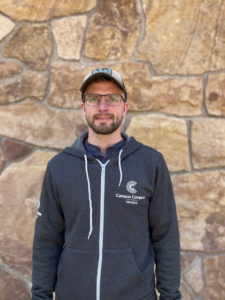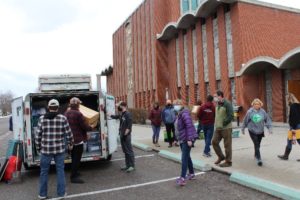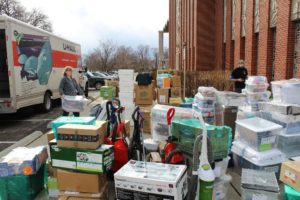Growth Through Adversity by George Lindbom

When President Biden decided to withdraw military forces from Afghanistan in August 2021, many Afghans chose to or were forced to flee their homeland. President Biden directed the U.S. Department of Homeland Security (DHS) to lead the federal government’s initiative to resettle these vulnerable Afghans. First, Afghans were transported to different military bases across the country and housed in military barracks that were quickly turned into extended-stay residences for individuals and families. Then, the DHS worked with refugee resettlement agencies, including the International Rescue Committee (IRC), to resettle the Afghans into different cities across the country. According to the DHS, over 76,000 Afghan nationals have joined communities in the United States since their evacuation from Afghanistan.
Over the last five months the IRC has worked to resettle the number of refugees that it would normally take over two years to resettle. As a Montana Campus Compact AmeriCorps service member serving with the IRC, I have helped resettle well over one hundred Afghan refugees and dozens of Syrian and Congolese refugees in Missoula. When a refugee family or individual is “resettled” into a community, they are provided base living funds for 3 to 6 months of expenses. Our IRC team helps refugee clients access public assistance benefits, secure permanent housing, find steady employment, receive medical care, and enroll children in schools and daycares.
IRC-Missoula has faced much adversity responding to the Afghan refugee crisis. Our director was swamped by media and interview requests. Our caseworkers were saddled with the enormous responsibility of managing each family’s resettlement. Our housing, employment, and health specialists were forced to do double or triple the amount of work normally expected of them. Our interpreters and administrative staff helped overcome language barriers and keep the lights running. And our social work practicum students, AmeriCorps members, and volunteers filled in all the gaps. As an organization, IRC-Missoula has grown substantially and continues to hire new staff members and bring on new volunteers.
During the busy times, which is often every day, refugee resettlement is tiring and stressful, but it is also extremely rewarding. My personal growth has not come easy, and I’ve faced much adversity during my time of AmeriCorps service. There have certainly been times when I’ve felt completely overwhelmed, but these types of difficult and challenging times force you adapt and improvise. I’ve gained communication, time management, and prioritization skills that will last me for the rest of my life.
For a couple days each week, I get to provide academic mentoring to students after school in collaboration with Soft Landing, a non-profit in Missoula that provides community support for refugees. During my academic mentoring sessions with Soft Landing, kids that I enrolled in school back in the fall astonish me with their growing apprehension of the English language. These kids have faced more adversity than all of us, but they continue to grow, laugh, and smile. It is simply incredible to witness.
Life is full of challenges and adversity, but there are plenty of opportunities to grow through adversity.


 Blog
Blog